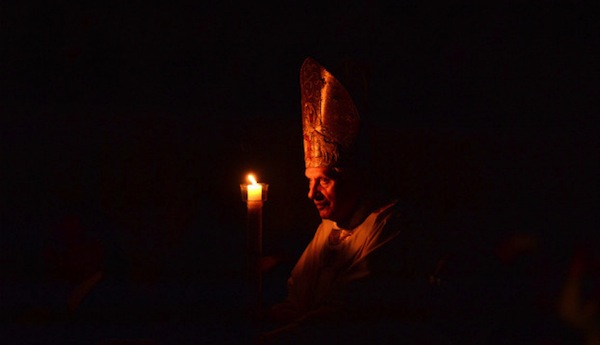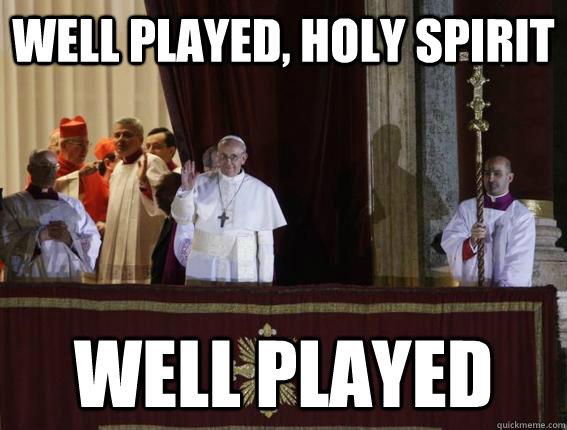Empty chairs at empty altars: Part 3
Yesterday I discussed Mike’s view of the Church and the awkward predicament which comes about from his belief in the conclusion of the sacraments, the papacy, the priesthood and apostolic succession. Today I’d like to finish off by looking at Mike’s treatment of Pope Benedict (who was Pope at the time of our correspondence).
Thus speaketh The Google!
Mike asked me “Why do you think you get over 1,000.000 hits … when you Google … ‘Benedict XVI is a heretic’?”. I said that the answer to that was easy! There are a lot of people non-Catholics out there who think Benedict is a heretic! I would suggest that, since these people would not be Catholic, Mike would probably regard such people as heretics themselves!
Additionally, it’s worth knowing that such a Google query would also return pages which speak of Pope Benedict fighting against heresy. But rather than spend time explaining in more detail how Google determines its search results, I decided to use Mike’s test and apply it to himself…
When I typed into Google the phrase “Mike is a heretic” I found I got 2,540,000 results! That’s over double the number of pages! So…what does that prove? Well, I’d say it probably proves about as much as Mike’s Google query for Pope Benedict…

Is the Pope Catholic?
In an attempt to demonstrate Pope Benedict’s heresy, Mike sent me the following quotation of Pope Benedict:
“Eucharistic devotion such as is noted in the silent visit by the devout in church must not be thought of as a conversation with God. (…) To go to church on the ground that one can visit God who is present there is a senseless act which modern man rightfully rejects.”
Source – “B-16” book: Die Sacramentale Begründung Christliche Existent (The Sacramental Justification Christian Existence), 1966, Kyrios Publishing, Freising-Meitingen-Germany.
He then asked me “Do you agree with ‘B-16’, your fake Pope, on this issue ? You should, you’re a member of his heretic cult”.
I had seen both Sedevacantist and Protestants point to these words of Pope Benedict before, but I’ll admit, the polemical use of this quotation puzzles me. There are two things worth pointing out…
Firstly, this quotation comes from Cardinal Ratzinger’s work as a private theologian, years before ascending to the throne of St. Peter. It’s therefore not subject to any protection from error. So, even if he was spouting heresy (which, as we will see, he’s not), it wouldn’t prove anything other than that a man who later became Pope at some point earlier in his life held heterodox opinions (and history already has quite a few of those…).
But secondly, what confuses me about citing this quotation is that, in order for one to conclude that the Benedict is denigrating Eucharistic Adoration or somehow denying the Real Presence, one must ignore all of his other writings on the subject…and his writings on this subject are substantial and demonstrate clearly that he believes in the Real Presence and regards Adoration is a good and pious thing to do.
The presentation of this quotation demonstrates the fundamental problem with Mike’s approach to theology: he begins with a hermeneutic of suspicion and doubt. He begins by assuming that the Pope rejects Catholic teaching. But why not begin with a hermeneutic of continuity? Why assume that a man is a schizophrenic rather than sane? Why not begin by assuming that the Pope is, in fact, Catholic?!
Ratzinger, re-translated & unabridged…
With that said, let’s consider the passage itself. Below is the same passage referenced by Mike, but from a different translation of the original German. In addition, I’m providing it here unabridged so as to provide us with better context:
“With regard to meaningfulness, Eucharistic adoration, or silent visits of the Eucharist in Church, cannot just be a conversation with the God thought to be present in a locally circumscribed way. Statements like ‘God lives here’, and conversations with the God thought to be locally present on the basis of such statements, express a disregard, for both the Christological mystery and the concept of God, that is off-putting to thinking people who know about God’s omnipresence. If one were to justify going to church by arguing that one ought to visit the God who is present only there, then this would indeed be an argument that made no sense and that would be rightly rejected by modern man.”
Source: “The Ratzinger Reader: Mapping a Theological Journey” (London: T&T Clark International, 2010), page 78.
Without the omissions, and using a better translation, it’s clear that Cardinal Ratzinger was simply arguing that Adoration should be understood within the larger context of the Incarnation and God’s omnipresence. There’s no heresy here, only Catholic orthodoxy.
I received no further rebuttal after sending this reply, only some name-calling. This brought my exchange with Mike to a close.
Conclusion
I hope the description of our exchange is helpful and that, if you encounter a sedevacantist at some point you’ll have a better idea as to what to expect and how you might choose to respond. This issue is quite a personal one for me because, a little while ago, I too was a sedevacantist. Fortunately, it didn’t last for long, since a few days later the Cardinals elected Pope Francis 😉
The article Empty Chairs at Empty Altars: Part 3 first appeared on RestlessPilgrim.net
